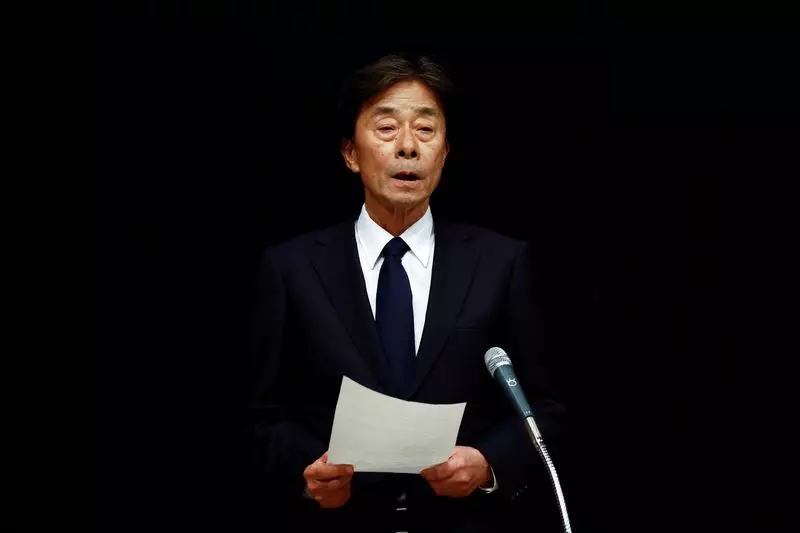In a shocking turn of events, Japan’s Fuji Media announced the immediate resignation of its chairman and the head of its television unit in connection with serious allegations of sexual misconduct involving a popular celebrity. The unfolding scandal has not only caused considerable upheaval within the company but has also sparked wider discussions about the systemic exploitation of women in Japan’s entertainment industry. With high-profile advertisers such as Toyota and Kao pulling back from their partnerships, the implications of this scandal reach far beyond the confines of a single firm.
The controversy ignited when allegations surfaced against Masahiro Nakai, a prominent television host and former member of the boy band SMAP, which was a major cultural phenomenon in Japan. The accusations came from leading tabloids in Japan, with reports alleging both personal misconduct and institutional negligence among Fuji Media executives who facilitated events where such behavior took place. The first signs of trouble began to emerge in December when Nakai was accused of inappropriate behavior during a private event arranged by Fuji executives. These revelations add to a grim narrative surrounding the treatment of women in the workplace and the entertainment sector in particular.
Fuji Media’s swift action in the wake of these allegations has been met with mixed reactions. Chairman Shuji Kanoh and Koichi Minato, the head of the television unit, both resigned amidst growing pressure from stakeholders and an active investor community demanding change. During a press conference, Kanoh apologized publicly, acknowledging the company’s failure to protect the rights of the woman involved. His comments reflect not only a sense of individual accountability but also point to a systemic issue that has long plagued the industry.
A disturbing claim from tabloid reports suggested that a woman was left in a compromising situation during a dinner where she was previously invited to accompany a Fuji executive. When that executive withdrew, she reportedly was left alone with Nakai, leading to an incident of sexual misconduct. This detail only exacerbates the already heightened sense of outrage and points to a significant gap in oversight and ethical responsibility within the organization.
The scandal surrounding Fuji Media is not an isolated incident but rather part of a troubling broader pattern within Japan’s entertainment industry. In a climate where similar allegations have resurfaced with alarming frequency, the resonance of these events echoes a movement akin to #MeToo that exploded in the Western world post-2017. The response to prevalent abuse in the workplace is long overdue, and the current Gallagher of questions about corporate accountability is desperately needed.
Johnny & Associates, one of Japan’s top talent agencies, recently announced its dissolution after revelations of decades of abuse perpetrated by its founder against young performers. Such institutional failings have not only tarnished reputations but also raised an urgent call for reforms to protect the vulnerable in these environments. The allegations against Nakai and the ensuing chaos at Fuji Media illustrate that change is essential if these industries wish to cultivate a more ethical culture moving forward.
As investor responses pile up, Fuji Media now faces significant pressure from activist stakeholders like Dalton Investments, who hold a considerable share in the company and have voiced criticisms regarding its handling of the allegations. Market reaction has been volatile; however, shares showed some signs of recovery likely fueled by optimism surrounding potential organizational reforms. This may indicate a glimmer of hope for those watching closely, but the lingering question remains: is an independent investigation enough to reverse the tide of distrust?
An independent committee composed of legal experts has been commissioned to investigate the implications of this scandal, with a report expected by late March. Whether this satisfies investor demands for a significant overhaul remains to be seen. The fundamental fact is that the path towards ethical integrity within Fuji Media—and the larger industry—will demand both introspection and action to bolster corporate governance and restore public confidence.
The haunting echoes of these scandals without doubt highlight a dire need for systemic reform within Japan’s entertainment landscape. As the Fuji Media saga unfolds and other industry giants grapple with similar accusations, a more profound conversation about women’s rights and corporate accountability must take center stage. With each resignation and each apology, the call for change grows louder—a clarion call to dismantle the silence that has long protected offenders and to cultivate a safer, more equitable environment for all participants in the industry. The challenge ahead is multifaceted, but the momentum for lasting change is more palpable than ever.

